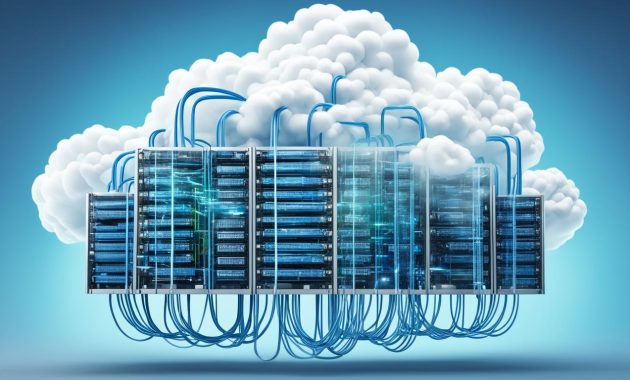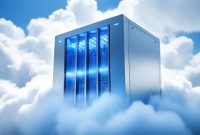In the world we live in today, businesses create and save a lot of data. So, having a secure file cloud server is essential, not just a nice-to-have. Meet FileCloud, a top choice for sharing files in businesses and storing them safely in the cloud1.

FileCloud lets you keep your files updated on all your gadgets. This means your most important info is always with you. It also keeps your data safe, thanks to backups and disaster recovery tools. You get to enjoy automatic updates too1.
It works well alongside Active Directory for managing users and groups easily. Plus, it’s packed with strong security like AES 256-bit encryption. This keeps your data safe from anyone trying to peek without your permission1.
Key Takeaways
- Secure cloud-based file storage and sharing with FileCloud
- Seamless data backup and disaster recovery capabilities
- Effortless integration with existing infrastructure
- Robust security measures to safeguard sensitive data
- Customizable branding and administrative controls
Benefits of File Cloud Servers
Seamless Access and Backup
Cloud file servers are as fast and secure as traditional ones. They let users easily get to, share, and back up files from any gadget2. These servers come with many helpful things like access anywhere, saving all file versions, and watching who does what. They also have a recycle bin and make working together easier.
There are many good uses for cloud file storage. It’s great for the web, looking at data, making media like videos, your personal files, saving databases, creating apps, and tools for users2. This kind of server helps companies work better together. It keeps their files safe and easy to use while allowing growth3.
Cloud file servers fit right in with what you already use. They add cloud benefits like working from anywhere and keeping files safe off-site.24
“Cloud file hosting is a money-saving choice that’s also dependable. It mixes the usual file server use with sharing more easily in the cloud.”
Cloud servers also have high-grade security. They keep data safe in many ways and follow strict rules like SAS 70, HIPAA, and FINRA4. This helps companies keep important files secure and control who sees them43.
Cloud servers offer both easy access and strong protection. This makes them a top pick for updating how businesses handle files and work together243.
Choosing the Right File Cloud Server
When businesses pick a file cloud server, they must look at many factors. They should match their own needs. Important points are how much storage they need, the level of security, if it works with other systems, and the way it can be set up5.
Storage space is key. The cloud server must have enough room for all the data a business has now, and will have in the future6. Cloud storage can easily grow with a company. This way, they won’t be limited by physical storage limits.
Keeping data safe is a big deal when it comes to cloud servers. Businesses need to find servers with top-notch security features. This includes encryption, various protection layers, and the ability to set specific user and file rules7. It’s also vital that the server meets rules for privacy and data protection in its field.
It’s also important that the server works well with what the business is already using. Easy integration with current systems means less hassle. It ensures data can move smoothly between platforms6.
The way a cloud server is set up, whether it’s fully online, partly online, or a mix, matters too. Servers on the public cloud are more flexible but have higher cyberattack risks5. A hybrid option, mixing secure on-site data hosting with public cloud’s flexibility, might be best for many companies7.
By looking closely at these factors, businesses can pick a cloud server that meets or exceeds their needs. It should offer great performance, be able to grow with the company, and manage data well567.
“Efficient data management systems are essential for businesses to stay competitive in the digital landscape.”6
Key Considerations for File Cloud Server Selection
- Storage requirements and scalability
- Security features and compliance
- Integration with existing systems
- Deployment model (public, private, hybrid)
| Factor | Considerations |
|---|---|
| Storage | Scalable cloud storage, unlimited client accounts, version control |
| Security | End-to-end encryption, granular permissions, compliance with regulations |
| Integration | Seamless integration with existing infrastructure, centralized data management |
| Deployment | Public, private, or hybrid cloud options to meet business needs |
By carefully evaluating these key factors, businesses can choose a file cloud server that delivers the performance, scalability, and advanced data management capabilities required to meet their evolving needs567.
Top File Cloud Server Solutions
Businesses looking for enterprise file cloud servers can consider top solutions like Microsoft OneDrive, Google Drive, Dropbox, Box, Sync, and Apple iCloud Drive8. These services bring features including easy file access and sharing, working together on files, and being able to connect with other tools8. It’s key for companies to think about what they really need. This includes how much storage they need, how safe the server is, and if it will work well with what they already have.
For file size limits, consider this: Microsoft OneDrive allows files up to 15GB8. Google Drive has a big file size limit of 5TB8. Sync, a newer choice, gives you 5GB for free and doesn’t limit how big a single file can be8. Apple users have iCloud Drive, but it’s not clear what the file size limits are for it8.
For paid plans, the big cloud services have many choices9. Google Drive costs $2 a month for 100GB, and $10 a month for 2TB. Microsoft OneDrive is $2 a month for 100GB, $7 a month for 1TB, and $10 a month for 6TB9. Apple iCloud has plans from $1 a month for 50GB to $60 a month for 12TB9. Dropbox offers 2TB at $12 a month and 3TB at $20 a month9.
In terms of keeping your data safe, some providers like IDrive have extra steps like end-to-end encryption and two-factor authentication10. IDrive also has a wide range of storage options, from a free 5GB plan to paid plans that go up to 10TB, and even a business plan that can go up to 50TB per user10.
Choosing the right file cloud server means looking closely at what your business needs. Think about the features, how much it costs, and how safe it keeps your information. By doing this, companies can pick a cloud storage service that meets all their needs. It will help them keep their important files safe and easy to reach from anywhere8109.
file cloud server Capabilities
File cloud servers have a wide range of features for today’s businesses. They offer safe file storage, access, and sharing. This is done while keeping control over who can see and use the files11.
They make it easy to work on files from any device. This is great for teams and partners who need to share work. With detailed permissions, managers can make sure only the right people see certain files11.
Staying compliant with laws is very important. File cloud servers help follow rules like HIPAA, GDPR, and ITAR. They have features to help meet these laws and keep information safe even when shared11.
File cloud servers also help businesses work smarter. They can organize work and help meet specific industry rules. This makes it easier to do business11.
These servers can be set up in many ways, like on your own network or in the cloud. This means you can pick how to manage your data best. You can choose what works for your security and access needs12.
Feature Benefit Secure Remote Access Enables anytime, anywhere access to files from any internet-connected device Granular Permissions Restricts access levels during collaboration to maintain confidentiality Compliance Center Assists in adhering to regulations like HIPAA, GDPR, and ITAR Workflow Automation Optimizes business processes and improves operational efficiency Hybrid Cloud Deployment Offers flexibility to choose the deployment option that best suits the organization’s needs
Using the full range of these servers’ features helps everyone work better. It improves how you store, share, and use your files. It also makes sure you follow the rules and protect your information111213.
On-Premises File Cloud Servers
Integrating with Existing Infrastructure
On-premises file cloud servers let businesses keep using their file servers on-site. This includes cloud benefits like easy access. They work well with systems like Active Directory for safe remote access without a VPN14. Also, they let companies control their data tightly, stopping outside access14.
There’s a mix, too. Companies can blend the power of their in-house servers with added cloud space14. FileCloud can store data on different servers, ensuring security with encryption and preventing data loss14.
14 Having servers on-site helps follow local data laws. Also, it means businesses don’t depend on outside help to get to their data14. This way, they can keep data really secure and fix issues fast14.
15 FileCloud gives businesses options in managing their data. They can move servers online or use a combination, all blending into their current system well. Plus, FileCloud is a top choice for sharing files at good prices15.
16 Deploying FileCloud on Windows servers is easy. It adds control over who gets to use files. Plus, it scans for viruses and protects from attacks16.
16 In big companies, FileCloud helps keep all files in one spot, easy to find and share. Also, you can move files fast just by connecting machines directly16.
Using your own server with FileCloud connects you to both worlds, sharing and keeping files safe. It’s a smart way to use what you have and get more141516.
Hybrid Cloud File Servers
The move to the cloud has greatly changed how businesses operate, offering more flexibility, growth potential, and savings. Yet, finding the right mix between storing files on-site and in the cloud is tough for many17. Hybrid cloud file servers are designed for this integration. They let you keep your existing file setup while using cloud benefits18.
These servers bring together the best of two worlds17. They mix the control of local storage with the reach and safety of the cloud. This mix lets companies keep data where they need to while enjoying the cloud for tasks like backup, remote work, and teamwork18. This means moving to the cloud doesn’t have to happen all at once, keeping current operations smooth.
A big plus of these servers is easy file access from anywhere, no VPN needed17. This boosts how teams work together and how quickly they can get things done. Team members can share and work on files securely from home or the office18. Plus, these servers offer extra features like controlling file versions and who can see what. This helps keep data in shape when many people are working on it18.
In the field of tech consulting, these servers make work smoother and safer17. They use the cloud’s help for disaster recovery, ensuring business keeps going even in a crisis. This strength is key for keeping customers happy and their info secure18.
Generally, hybrid cloud servers offer a versatile and growing solution for today’s companies17. They pull from local and cloud storage to boost work, keep data safe, and ease tech changes. As the tech world keeps changing, these servers are in a prime spot to support a business’s journey1819.
Feature Benefit Seamless integration of on-premises and cloud storage Ensures data accessibility from anywhere, at any time18 Continuous, real-time, redundant backups across multiple locations Enhances data protection and disaster recovery capabilities18 Advanced collaboration features, including file locking and versioning Improves team productivity and data integrity18 Granular access controls for administrators Allows for efficient management of user permissions and restrictions18
“Hybrid cloud storage combines local and off-site resources for enterprise storage management, enabling businesses to leverage the best of both worlds.”18
Welcoming hybrid cloud file servers can open up great advantages for organizations. These range from better mobility and work efficiency to tight data security and streamlining operations17. In the face of complex cloud moves and data needs, these servers offer clear benefits. They stand ready to lead a company’s tech progress191718.
Security and Compliance
Secure file cloud servers need strong security features. These features protect sensitive data20. FileCloud’s Compliance Center helps with rules like ITAR, HIPAA, GDPR, NIST 800-171, and PDPL (Saudi)20. This makes it easy for managers to check that they’re meeting rules20. For instance, ITAR helps protect secret info at firms related to defense20. HIPAA keeps health data safe and GDPR ensures privacy laws are followed when handling personal info20.
Encryption and Data Protection
FileCloud comes with strong security, like stopping data leaks and shielding from ransomware20. It also encrypts info from start to finish20. Plus, it uses special tags and checks documents to follow rules and stop sharing of private files20. Ensuring security is a big deal for all organizations. FileCloud gives tools to help managers and IT teams meet compliance needs20.
Cloud file storage has its own set of rules to follow21. The PCI DSS, for example, needs 12 rules to be compliant21. It’s okay to store credit card info in the cloud if it’s well-encrypted21. Storing such data safely in the cloud means following strict security measures and getting a compliance statement from the cloud service21. Key things include proper access security and strong encryption for PCI DSS21.
FileCloud also meets CMMC 2.0 rules22. CMMC has different levels, each with its own set of practices and controls22. Getting certified in CMMC lasts for three years22. FileCloud is part of a solution that helps with storing and sharing certain federal info safely22.
FileCloud offers many features for strong security and compliance. It uses encryption, two-factor verification, and follows laws like GDPR, HIPAA, and CMMC. This makes it great for companies wanting to keep their data safe202122.
Integration and Scalability
For companies that want to bring all their files together, seamless integration with cloud servers is key. Tools like FileCloud give you a lot of freedom with APIs and ways to modify it. This means you can make it work with how you already do things. It makes joining new tools fast and easy, just like fitting puzzle pieces together. This setup saves a lot of time and money23.
One big plus of using a cloud solution is how easy it is to make changes based on what you need. Imagine you have a big project coming up, more people can easily work on it together. And when things slow down, you don’t have to pay for extra stuff you’re not using. This kind of flexibility is a game changer for many businesses23.
When considering a new file cloud server, scalability is at the front of the line. It’s not just about how much storage or how many users it can handle now. It’s about knowing it can grow with you. FileCloud steps up here by offering unlimited space for all your files and users as your company grows24. It even lets you put your own face on the platform, making it feel uniquely yours. This helps keep your brand strong and clear to everyone who uses it24.
With easy integration and the ability to grow when you do, businesses find managing their files much smoother. It makes everyone’s work easier and keeps your company’s look consistent everywhere2324.
“Cloud data integration enables building and running advanced integrations at speed and scale using pre-built templates and reusable mappings.”23
Altogether, the way enterprise cloud servers handle integration and growth is incredibly important. It helps companies work better together, no matter what changes come their way232425.
Unifying File Servers
Many organizations face the task of dealing with scattered file servers at various sites26. This can slow down remote access, disrupt teamwork, and complicate data management. Yet, the emergence of file cloud servers provides a solution. It allows companies to bring their file systems together, making operations smoother.
With file cloud servers, companies merge files from different places into one secure location26. This makes it easier for staff to work together, even if they’re in different offices26. These servers are also very secure, using strong encryption and safe data tunnels to protect information.
Merging servers also helps control data better by offering centralized oversight and better reporting26. Now, administrators can easily manage who sees what in the folders. They can also check how much storage is used and review any changes made to files26.
Switching to a unified file cloud server system has major perks, like boosting productivity, tightening security, and making data management easier27. It cuts down IT costs and complications. Plus, it opens doors for better teamwork and fresh ideas27.
The quest for a complete, unified file cloud server solution keeps growing as the tech market shifts27. Companies want a system that blends well with their tools, allows offline work, and is easy to control27. Service providers that meet these needs well will lead the way in changing how file servers work for modern businesses.
CentreStack stands out in this field, with thousands of IT firms and companies trusting its cloud storage28. Its solution has modernized how groups from different sectors work, boosting real-time collaboration and data security28. Thanks to innovative functions and solid data oversight, CentreStack is pivotal in the push to unify file servers, offering real value to all kinds of businesses.

“CentreStack’s cloud storage solution has revolutionized our IT infrastructure, enabling enhanced efficiency, reduced costs, and a more satisfied workforce.” – IT Manager, Insurance Company
Conclusion
File cloud servers help businesses upgrade their file storage and access. These platforms mix the quickness and control of regular servers with cloud benefits29. They allow businesses to boost how productive their employees are and make their data more secure. Also, they help companies organize their IT systems better while still owning their data.
Many businesses are moving to cloud file sharing for its perks like ease of use, saving money, teamwork features, and data backup29. But it’s important to think about the possible challenges. These include security threats, needing the internet to work, and not having total control over downtime and costs29. Businesses must carefully consider these factors to make the best choice.
For companies looking to improve how they handle files, file cloud servers offer a modern, safe option. They support working from anywhere, make teams work together better, and protect important information30. Using file cloud servers helps businesses do better, work more efficiently, and keep their data safe. This prepares them for the future in the digital world.
FAQ
What are file cloud servers and how do they work?
File cloud servers let you get to your files like documents and photos from any device. When you save things in the cloud, they’re also backed up. This means you can still see your stuff if you break or lose your device. Plus, you can work with others on the same file at the same time. The system remembers all versions, making sure no work is lost.
What are the key benefits of using a file cloud server?
The great thing about file cloud servers is you get the best of both worlds. They’re as fast and safe as a regular server but also let you work from anywhere, like the cloud does. For users, this means you can pull up, share, and safeguard your files with ease. Plus, those in charge can keep a close eye on who gets to see what and how the files are used.
What factors should businesses consider when choosing a file cloud server solution?
Businesses need to think about how much storage and what level of security they need. They also should look at how well a file cloud server will fit in with their current setup and what type of cloud deployment is best for them. The ideal solution will provide top performance, more room as you grow, and smart ways to manage your files.
What are some leading file cloud server solutions on the market?
Some popular choices are Microsoft OneDrive, Google Drive, Dropbox, Box, Sync, and Apple iCloud Drive. They let you get to your files easily, work together on them, and connect with other tools you use. These services are known for their simple interfaces and versatility.
What key capabilities do file cloud servers provide?
File cloud servers offer a lot, like a safe place for your files, the ability to get to them from far away, and ways to work together on them. They also keep an eye on your data and let you know if something’s wrong. For those in charge, these solutions offer a one-stop spot to make sure files are used correctly.
How do on-premises file cloud servers differ from cloud-based solutions?
On-premises file cloud servers use your existing setup but bring in cloud benefits. This includes being able to securely get to your local files from far off without a special network. Businesses can thus enjoy the convenience of the cloud without giving up full control.
What are the advantages of a hybrid cloud file server approach?
Hybrid cloud file servers make it easy to move your current file setups to the cloud. They offer faster access, less waiting time, and the chance to bounce back from a disaster more easily. This approach mixes the best of local and cloud storage, offering the perfect balance.
How do file cloud servers address security and compliance requirements?
File cloud servers focus on keeping your data safe and following the rules. They use strong encryption, extra checks when signing in, and protection from online threats. Businesses can also choose where to keep their data, making sure they obey laws like GDPR.
How do file cloud servers integrate with existing business systems and tools?
File cloud servers for business can be made to work smoothly with what you already use. Customization features and plenty of ways to connect mean you can make it fit right in. This way, companies can keep their digital work organized and efficient.
How can file cloud servers help businesses unify their file server infrastructure?
By using file cloud servers, businesses can make all their data easy to find in one place. This simplifies working together no matter where someone is. It also makes keeping an eye on how files are used much simpler, improving overall file management.
Source Links
- Secure File Server – File Storage, Backup, Secure File Sharing
- What is File Storage? – Cloud File Sharing and Storage Explained – AWS
- qa.com | 10 benefits of using cloud storages
- Cloud File Server – Online Storage and Collaboration
- Cloud Based File Server Solution for Businesses | FileCloud
- Seamlessly And Securely Replace File Servers With FileCloud
- File Server vs Dropbox vs pCloud vs SharePoint vs FileCloud
- The Best Cloud Storage and File-Sharing Services for 2024
- Best Cloud Storage Software Options
- Best cloud storage of 2024
- FileCloud Server
- Cloud File Server for Business | Online File Server, Storage & Backup
- On-premises Cloud File Server
- On-Premises Server – Self Host Enterprise Data on Own Server
- On-Premises vs Cloud – Key Differences, File Sharing and Security – FileCloud
- On Premises File Sharing and Sync Solution for Enterprises
- Azure Hybrid File Server for SMBs: Cloud & On-Prem Integration
- Hybrid Cloud Storage – On-Premise Windows File Servers to the Cloud
- Hybrid Cloud File Server – On-Premise Windows File Servers to the Cloud
- FileCloud Compliance Center
- PCI Compliance in the Cloud
- Cybersecurity Maturity Model Certification – CMMC Compliance | FileCloud
- What is Cloud Data Integration
- Build Your own Cloud Storage File Server
- What is Cloud Storage?
- File Share Server | Fast, Secure & Affordable | FileCloud
- What is a cloud file server
- Cloud File Server with Secure File Sharing for Businesses
- The Pros and Cons of Cloud-Based File Sharing – TitanFile
- Cloud File Sharing



